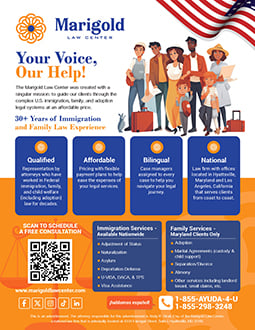Skilled Guidance From Attorneys For Asylum, Withholding Of Removal And Protection Under The Convention Against Torture
Those who fled their native country because they were harmed or tortured or fear returning to their homes for those same reasons may qualify for a form of legal status in the United States.
To seek these protections, a migrant must file a Form I-589, Application for Asylum and Withholding of Removal. Form I-589 can be filed with the United States Citizenship and Immigration Services (USCIS) or with an immigration judge in removal proceedings.
If you seek political asylum or other legal protections, the experienced lawyers at Marigold Law Center can assess the possible pathways to gain legal status in the United States. With offices in Hyattsville, Maryland, and Los Angeles, California, we offer guidance to people across the country for complicated immigration issues.
Asylum
An applicant for asylum must provide proof that they have experienced persecution in their native country or fear that if they return, they will be persecuted. That said, the persecution applicants suffered, or will suffer, must be on account of the applicant’s:
- Nationality
- Race
- Religion
- Political opinion
- Membership in a particular social group
In addition, the applicant must be sure to file a Form I-589 within one year of entering the United States. If an applicant fails to file – without an adequate excuse – Form I-589 within the first year of their arrival to the United States, applicants should consider seeking withholding of removal or protection under the United Nations Convention Against Torture and Other Cruel, Inhuman, or Degrading Punishment (CAT).
Once an asylum application is approved, a migrant is designated as an asylee. An asylee is given protection from deportation and is permitted to seek adjustment of status after one year.
Withholding Of Removal
To qualify for withholding of removal, applicants must show it is more likely than not that their lives or freedom would be jeopardized in their home country on account of their race, nationality, religion, political opinion or membership in a particular social group. A grant of withholding of removal ensures that an individual won’t be returned to the country where threats against their life or freedom exist.
Convention Against Torture (CAT)
To qualify for protection under CAT, an applicant must show that they likely face torture in the proposed country of removal. Torture is defined as an extreme form of cruel treatment that causes severe physical or mental pain and suffering or is intended to cause severe pain and suffering.
Torture can be an act inflicted for various purposes, including obtaining valuable information or a confession, punishing the victim for some reason, intimidation, coercion or for any reason based on discrimination of any kind.
Torture must be inflicted by or at the instigation of, or with the consent or acquiescence of, a public officer or other person acting in an official capacity. The victim must be in the custody or physical control of the torturer. Torture does not include the pain and suffering that arises only from, is inherent in or is incidental to lawful sanctions.
Key Differences In Forms Of Relief
The most important distinction among asylum, withholding of removal and protection under CAT is the standard of proof. The standard for withholding of removal and protection under CAT claims is significantly higher than for asylum.
In addition, only immigration judges and the Board of Immigration Appeals (BIA) may grant withholding of removal or protection under CAT.
Finally, another important difference is that a grant of withholding of removal or protection under CAT does not lead to a green card, as with asylum approvals. Further, while a spouse and minor children can automatically receive asylum protection upon a favorable grant, there are no derivative benefits for spouses and children with grants of withholding of removal and protection under CAT.
Assess Your Legal Rights By Scheduling A Free Consultation
Requesting asylum, withholding of removal or protection under CAT is a complicated process and should not be navigated without the guidance of a skilled asylum lawyer. For more information, call Marigold Law Center toll-free at 323-714-0195 or email us to schedule a free consultation. We serve people nationwide from our offices in Hyattsville, Maryland, and Los Angeles, California.


